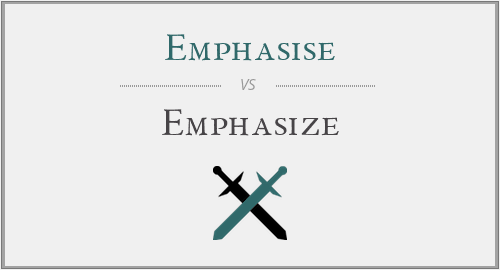Emphasise” and “emphasize” are causing quite a lot of controversial opinions and discussions. Some claim that “emphasise” is the misspelling of “emphasize”, others say it’s vice versa, and other believe both forms are correct. So, who’s right? How are you using this verb?
If you’re having any doubts before typing “emphasize” or “emphasise” in your communications, or if this matter is annoying you because you never get a clear answer, you’ve came to the right place. We will clear this entire problem for you, with short and concise explanations. Find out what’s the thing with “emphasise” and “emphasize” and how to use these words correctly, making sure you are making no grammatical error.
Emphasise vs. Emphasize
At a first look in the dictionary, you’ll clearly see that “emphasize”, referring to the action of showing how something is especially important or needs particular attention, is defined as a verb, and “emphasis” is defined as a noun. From here, you can make a quick deduction that people have confused the noun “emphasis” for a verb and they erroneously concluded that “emphasise” is the way the verb is spelled.
But, if you take a second look, closer to the verb “emphasize”, you’ll immediately see that the spelling “emphasise” is also accepted and recognized as a correct form of the verb. Why is that? Well, it’s simple. Set your Word Document in US English, and it will underline the word “emphasise” in red, telling you that “emphasize” is the correct spelling. Set it in UK English, and the autocorrect program will do the opposite, claiming that “emphasise” is the correct verb. Is it clear now, which is the difference between the two words? Yes, you’ve guessed right. It’s the linguistic difference: British English uses “emphasise” spelled with an “s”, whereas American English prefers “emphasize” spelled with a “z”.
When do we use “emphasise”?
As “emphasise” is defined as the spelling preferred in UK English, it’s obvious that the most recommended context to use this spelling is in a conversation in British English.
Example: I can’t emphasise enough the importance of your vote! – “emphasise” is the UK spelling of the verb.
When do we use “emphasize”?
This spelling is also the most frequently used and preferred by most typing programs; “emphasize” is the spelling recommended in US English conversations, where this form is considered the correct one.’
Example: I can’t emphasize enough the importance of your vote! – “emphasize” is the US spelling of the verb.
Conclusion
No, there is no lexical difference between “emphasise” and “emphasize”, and neither grammatical details that vary. Both words refer to the same action and both function the same way in a sentence. The only thing that makes them different is the linguistic preferences in the UK and in the US. “Emphasise” is the spelling preferred in UK, whereas “emphasize” is the US spelling considered correct. Otherwise, both forms are accepted and mentioned in all notorious English dictionaries and you can use them worriless in your conversations.





Have a discussion about this article with the community:
Report Comment
We're doing our best to make sure our content is useful, accurate and safe.
If by any chance you spot an inappropriate comment while navigating through our website please use this form to let us know, and we'll take care of it shortly.
Attachment
You need to be logged in to favorite.
Log In